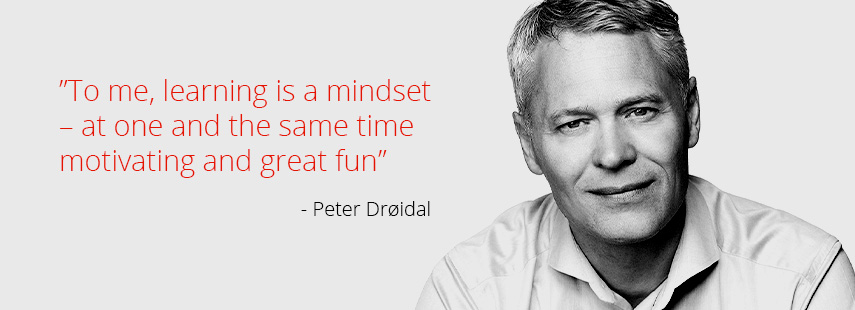Lifelong learning differs from one individual to the next. In this series, we ask a number of people from the life science field, what lifelong learning means to them and what has shaped their development path.
Peter Drøidal is the first guest in our series of interviews on learning and competence development. He is Novartis’ Danish country manager and also in charge of the company’s Nordic Market Access. Moreover, he is chairman of the board of the Danish Association of the Pharmaceutical Industry (Lægemiddelindustriforeningen (Lif)). To Peter Drøidal, lifelong learning is about continuously placing oneself in new and unaccustomed situations.

Willingness to move
New frameworks for his family of four, new colleagues, new work routines, different processes and an unfamiliar culture. Such was the reality for Peter Drøidal when, in 2018, he and his family exchanged their familiar everyday life in Copenhagen with an adventure on the other side of the globe – in South Korea, to be precise.
We’ll get back to that later on, but it is the decision as such that is crucial to Peter Drøidal’s view on competence development. Being conscious of one’s own standpoint combined with a willingness to change is absolutely essential: “Leave your comfort zone – it’s where you learn in earnest. All the way through my career, I’ve focused on regularly placing myself in new and unfamiliar situations”, says Peter Drøidal.
Constant learning and development
According to Peter Drøidal, you can’t avid constant learning and development when operating in a knowledge intensive environment. Whenever he embarks on something new, he considers this to be equal parts scary and fun – and always highly motivating.
“It definitely brings a sinking feeling to my stomach, but it also keeps me on my toes, and once I get a grasp of it, it provides drive and enthusiasm”, he says, continuing, “in my experience, when I take the plunge into something new, this accelerates my learning”.
A strong team created confidence
Recalling what has been decisive in his desire to try something new, on period of time stands out: he was a member of a vigorous sales team in which new ideas were supported and which provided confidence and security.
“We were a group of heads of sale with Pfizer who shared a truly constructive atmosphere concerning the concept of personal development. This was true for the individual as well as for the various teams, regardless of whether it was a matter of sales, managerial or collaboration competences. It was a time that gave me the courage to leave my comfort zone – it was a safe environment in which to challenge oneself”, Peter Drøidal remembers.
Management and learning through confidence in others
To Peter Drøidal, the posting to South Korea came to represent one of the most significant steps out of his comfort zone. Nothing from the well-known everyday-life in Denmark had accompanied him to South Korea where trust in combination with the desire for learning came to represent absolutely crucial elements.
”To me, learning is a mindset – at one and the same time motivating and great fun. Constant development is necessary in life science, but it is also something I practice for my own sake. It really is rewarding once you have conquered the worst insecurity – an insecurity which you need to embrace. In South Korea, it became extremely clear to me that ‘here, you are completely ignorant’ and, consequently, I had to lead and learn through trust in others”, Peter Drøidal explains.
An element in a learning organisation
Continuous supplementary competence-upgrades and courses have been natural elements in Peter Drøidal’s own development. Novartis, his current workplace, is a learning organisation with considerable focus on employee development.
“We stimulate and exploit positive things and, also, we pay attention to closing competence gaps and strengthening self-perception. Without self-insight, it is difficult to develop and, for instance, work on your strengths and weaknesses”, Peter Drøidal explains.
Never hide your development areas
Learning may take place in many environments: on the job, in networks, through courses and education, in interdisciplinary collaboration, or something completely different. The desire to develop is important, but vanity may obstruct the path to learning.
“It is important to ‘benchmark’ yourself against external requirements while, at the same time, understand your own competences and not be afraid to enter into something that may be difficult or unfamiliar. The worst you can do is to try to hide your own development areas… recognise them and get going”! Peter Drøidal concludes.
Your market value as an employee is directly linked with your sharpness. So, how fast do you acquire new knowledge? We guide you on 7 ways to build a better brain. Lifelong learning differs from one person to the next. We interview life science professionals about the meaning of lifelong learning for them. Hear Diana Arsovic Nielsen, CEO of Danish Life Science Cluster, point of view. Taking a course isn’t just a way to get a professional knowledge update – it’s also a motivation boost. A report card from our course participants. Was this relevant for you? In that case we have these 3 recomendations for you:
Hi!
Sign up for our newsletter and receive more articles with tips and thoughts on the influence of life long learning on your motivation and career development.